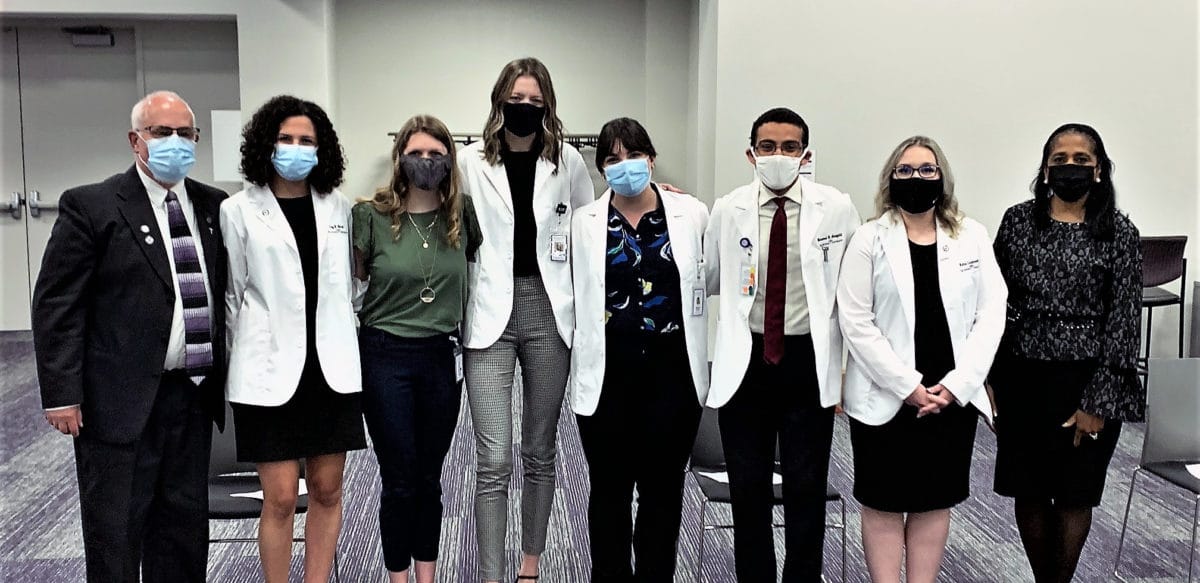The study of the human body is essential in the study of medicine. On May 21, 2021, Des Moines University honored 36 individuals, 9 of them honored veterans, who generously donated their bodies to DMU’s Body Donor Program to further medical education. In the past, the annual body donor memorial drew hundreds of DMU students, employees and donors’ families to campus, but, like last year, the event was held virtually this year due to the COVID-19 pandemic.

During the virtual memorial service, students representing five DMU degree programs and the military expressed their gratitude to the donors and their loved ones. DMU President and CEO Angela L. Walker Franklin, Ph.D., and Donald Matz, Ph.D., chair of the anatomy department, also spoke at the event, and the DMU Choir performed several musical pieces.
“Every donor helped train around 220 students from the D.O. Class of 2024,” said Kelsie Linderblood told memorial attendees. A graduate of DMU’s master of science in biomedical sciences (M.S.B.S.) program and current student in DMU’s doctor of osteopathic medicine (D.O.) program, she is president of the D.O. Class of 2024. “According to some health care IT experts, it’s not unreasonable for one doctor to see 25,000 patients throughout their career. This means that your loved one’s selfless donation will likely impact a minimum of five million patients…It isn’t just the knowledge of anatomy that will help these five million patients, but also the humility, compassion and respect that we’ve gained while caring for your loved one in a time when they were at their most vulnerable.”
Despite having to occur virtually, the memorial still was a celebration of the lives and contributions of the donors, said Mohamed AbdelGilil, a student in DMU’s doctor of podiatric medicine (D.P.M.) program and president of the D.P.M. Class of 2024.
“This day is about your loved ones dedicating their lives to science, growth and understanding of the complex make-up of the human body,” he said. “I remember during anatomy lab, we would see different donor bodies that varied in so many ways…It truly taught me that each of my future patients will be different and will require different ways of integrating treatment just tailored to them.”
Carlye Marshall, a student in DMU’s physician assistant (PA) program and president of the PA Class of 2022, told attendees that experiencing the anatomy lab during the global pandemic made her even more grateful to those who chose to donate their bodies.
“They donated their bodies to people that they do not know nor will ever meet. It was never about them; it was about contributing to the future of medicine,” she said. “It’s about finding cures for illnesses that have killed thousands. It’s about understanding that not every body is the same; we are all unique…It’s about appreciation for human life.”
About the DMU body donor program
Des Moines University relies on the voluntary donation of bodies for anatomical and surgical study by its students. Donated bodies are indispensable in the training of future physicians and health professionals. As of May 1, 2021, 3,067 people have donated the ultimate gift to DMU since detailed recordkeeping began in 1955. When an individual donates their remains to the program, the University reimburses a portion of the transportation costs, provides cremation services for the donor’s family, and includes a personalized plaque of each donor studied that year.
“Thanks to the incredibly selfless gift made by these individuals, we are able to uniquely educate and train our DMU students in anatomy, as well as educate students from local schools about how to take care of their bodies,” said Donald Matz, Ph.D., chair of the DMU anatomy department.
Making arrangements prior to someone’s death is uncomfortable to discuss at times, but planning ahead ensures the body donor’s wish will be fulfilled. For more information about DMU’s Body Donor Program, contact Ed Christopherson, F.D., B.S. body donation coordinator of the program, at 515-271-1481 or bodydonor@dmu.edu, or visit the program’s website.
To memorialize donors, the program provides each donor family with a keepsake snowflake tree ornament, personalized with the donor’s name, year of birth and year of death.
“Donating an individual to our program is a humble decision along with an indispensable gift to our medical students. The donors understand the importance of education, and this is why many selflessly give their body for medical education,” says Christopherson. “Providing a personalized keepsake during one of the most emotional holidays after the loss of a loved one is another way to say ‘thank you’ to the donor’s family.”
The University also provides a graveside service at Chapel Hill Gardens in Des Moines for families who choose to bury their loved ones in the body donor mausoleum space.
“A graveside service is a time of reflection, remembrance and the unfortunate emotions of finality of a death,” Christopherson says.
In addition, donor families of veterans can request to schedule a graveside service at the Iowa Veterans Cemetery in Van Meter through the body donor program office. Veteran donor families also will have the option to receive a United States flag during the military honors portion of the DMU memorial service, as many veteran donor families aren’t provided a flag at the time of their loved one’s passing.

